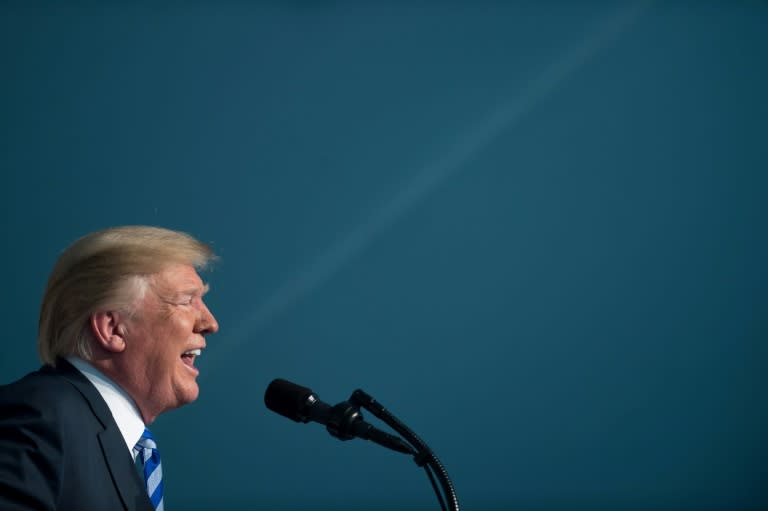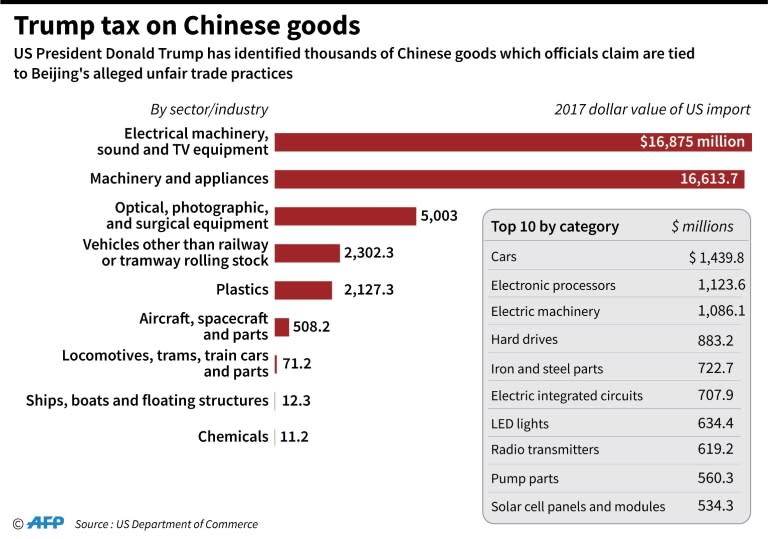US-Mexico trade talks progressing but no breakthrough with China
US officials holding a two-front battle in President Donald Trump's bid to revise major trade ties made progress with Mexican negotiators but found no breakthroughs with a Chinese delegation this week. The North American Free Trade Agreement and China have been two key targets of Trump's aggressive trade strategy and he has largely brushed off concerns from the business community about the harm done to the US economy. With NAFTA at least, there has apparently been progress. The negotiations "are well advanced," Mexican Economy Minister Ildefonso Guajardo told reporters on Thursday, but "we are not there yet." Canada needs to re-engage in the talks before the NAFTA rewrite can be completed and "the only way that can happen is if we continue through the weekend and into next week," he added. Guajardo and Mexico's Foreign Minister Luis Videgaray have been shuttling back and forth to Washington for more than a month for meetings with US Trade Representative Robert Lighthizer to try to iron out the bilateral issues, such as rules for the auto market, before the end of August. Officials last week indicated they expected a breakthrough this week but "negotiations are highly complex," Guajardo said on his way into yet another meeting. He has cautioned that some of the hardest issues were still on the table, including the US demand for a five-year "sunset clause," which would oblige the three countries to renew the pact regularly. "There's been no indication of flexibility from the US on this issue," a senior Canadian official told AFP. Nevertheless, Canadian Prime Minister Justin Trudeau said Thursday that he was "encouraged by the optimism expressed by the US and Mexico." "We're ready to sit down and continue the hard work of modernizing and negotiating a better deal for all of us," he said, but stressed Canada would "only sign a good deal for Canadians." Canada's top diplomat and chief NAFTA negotiator, Chrystia Freeland, said Wednesday she would rejoin the talks once Washington and Mexico City finish their bilateral discussions. The three countries have been negotiating for a year to salvage the trade pact Trump says has been a "disaster" for the United States. - No breakthrough with China - As part of Trump's aggressive trade stance, Washington hit China with 25 percent punitive duties on another $16 billion in goods starting Thursday, triggering a swift tit-for-tat retaliation from Beijing. China filed a complaint against the latest tariffs at the World Trade Organization the same day, the commerce ministry said. Adding to the $34 billion targeted in July, that brings the total two-way trade weighed down by the steep tariffs to $100 billion, and the United States currently is considering hitting another $200 billion -- a move Trump indicated could come very soon. "We've put a $50 billion number out there. Now, the total number is $250 billion," Trump said at the White House on Thursday. "And there's a 25-percent tax on that, now, coming in.... Some of it starts in a week." Washington is accepting public comments on the $200 billion tariff tranche until September 6, but they could take effect soon after. That is on top of US tariffs on a total of 10,000 products, including Chinese appliances and solar panels as well as steel and aluminum from around the world. China's Vice Commerce Minister Wang Shouwen and Vice Finance Minister Liao Min concluded two days of talks with a US team lead by David Malpass, US Treasury under secretary for international affairs -- their first trade discussions since June. The Chinese commerce ministry said the delegations had held "constructive and frank" trade talks. "The two sides will keep contact regarding future plans," the ministry said in a brief statement. White House Deputy Press Secretary Lindsay Walters said the talks concluded after officials "exchanged views on how to achieve fairness, balance and reciprocity in the economic relationship." Trump has threatened to target all $500 billion in goods the US imports from China, noting that Beijing cannot continue to retaliate in kind since it imports less than $200 billion a year in American goods. - Economic damage - US businesses have become increasingly concerned about the exchange of tariffs, which are raising prices for manufacturers and hurting US consumers and farmers. But Trump has been unapologetic, insisting that his tough tactics will work. Federal Reserve officials warn escalating trade disputes are "a potentially consequential downside risk" for the economy, possibly fueling inflation and impeding investment. S&P Global Ratings on Thursday downgraded motorcycle maker Harley Davidson's debt rating, citing retaliatory tariffs among other "headwinds" facing the company. And National Retail Federation Vice President Jonathan Gold said the tariffs "threaten to increase costs for American families and destroy the livelihoods of US workers."




